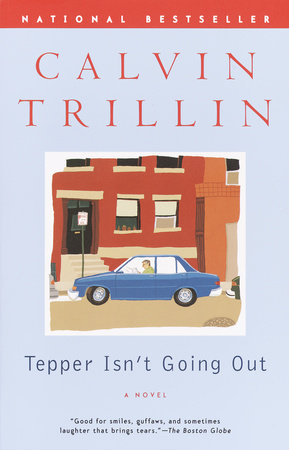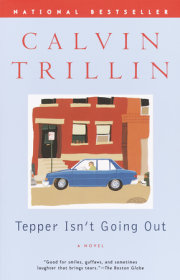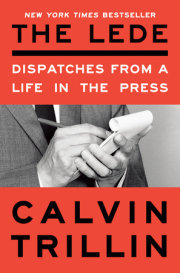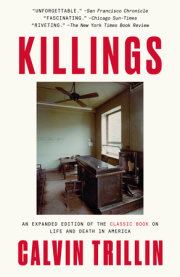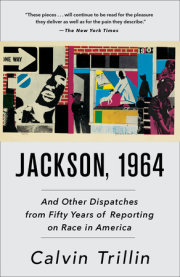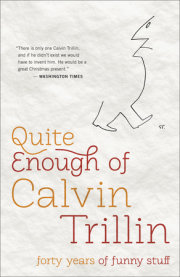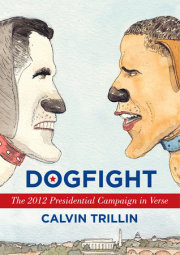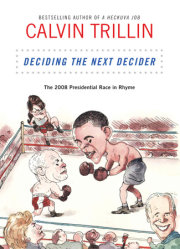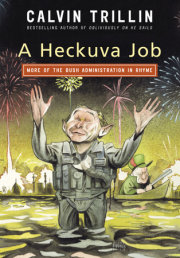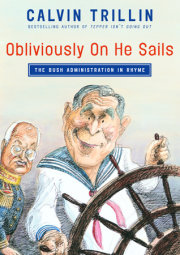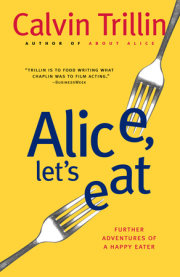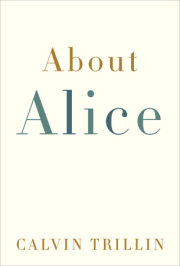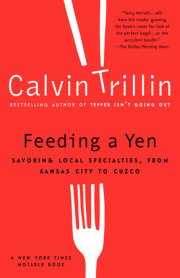"It's absolutely unconscionable," the young man said loudly, shaking a banana in front of the fruit peddler's face. "It's simply not to be believed. It's unbelievable."
Murray Tepper looked up from his newspaper to see what was happening. Tepper was sitting behind the wheel of a dark blue Chevrolet Malibu that was parked on the uptown side of Forty-third Street, between Fifth and Sixth. Across the street, an argument was going on between an intense young man in a suit and the peddler who set up a stand on Forty-third Street every day to sell apples and bananas and peaches to office workers. Tepper had seen them go at it before. The young man was complaining about the price that the peddler charged for a single banana. The peddler was defending himself in an accent that Tepper couldn't place even by continent. There had been a time when the accents of New York fruit peddlers were dependably Italian--Tepper had for years thought of "banana" as a more or less Italian word, in the way that some New Yorkers thought of "aggravation" as a more or less Yiddish word--but that time had long passed. As the young man in the suit practically pulsated with outrage, the peddler repeated a single phrase over and over again in his mysterious accent. Finally, Tepper was able to figure out what the peddler kept saying: "free-market economy, free-market economy, free-market economy. . . ."
It was six-thirty on a Tuesday evening in May. The air was mild. For ten days, there had been clear skies and spring temperatures, disappointing those New Yorkers who liked to complain every May that the weather had changed from bitterly cold winter to brutally hot summer as if God--a stern and vengeful God--had flipped a switch. Tepper was comfortable in the suit he'd worn to work that day--a garment that was in the category he sometimes referred to as "office suits," slightly worn and maybe a bit shiny at the elbows. He thought of his office suits as the equivalents of the suits a high-school teacher nearing retirement age might wear to school. In fact, Tepper thought of himself as looking a bit like a high-school teacher nearing retirement age--a medium-sized man with thin hair going gray and a face that didn't seem designed to hold an expression long.
There was plenty of light left on Forty-third Street. Tepper was reading the New York Post, which he still considered an evening paper, even though it had been coming out in the morning for years. The proprietors of the Post could publish it any time of day they wanted to; Tepper read it in the evening. People who had finished up late at the office were walking briskly toward the subway stops or Grand Central. A few of them, before going their separate ways, stopped to chat with colleagues at building entrances. The chats tended to be brief, perhaps because the entrances still smelled something like the bottom of an ashtray from a full day of smokers having ducked out of their smoke-free offices to pace up and down in front of the building, taking long, purposeful drags and exchanging nods now and then, like lifers in the exercise yard greeting people to whom they had long ago said everything they had to say.
Aside from an occasional argument over the price of fruit, Forty-third Street didn't provide much entertainment for Tepper. Forty-seventh Street between Fifth and Sixth, just a few blocks uptown, would undoubtedly be livelier. Forty-seventh Street was the diamond district, after all, and it had always fielded an interesting variety of pedestrians--Hasidic Jews taking a break from their diamond-cutting jobs, young couples on their way to buy an engagement ring from a dealer who had apparently given a very good deal to some acquaintance's brother-in-law's uncle, innocuous-looking security people on the alert for thieves who knew that any number of people walked up and down Forty-seventh Street with thousands of dollars' worth of diamonds jangling in their pockets. Tepper had, in fact, bought his wife's engagement ring on Forty-seventh Street many years before, from a man whose device for building trust was to confide in the customer about the perfidy of other dealers.
"See that one over there," Tepper's dealer had said, indicating with a quick jerk of his eyebrows a small man in the booth across the way. "Perlmutter. I saw him sell a piece of cut glass to a young couple by implying, without actually saying so in so many words, that it was a four-carat diamond that may have been--may have been, he wanted to emphasize; he didn't claim to have proof of this--worn by Marie of Rumania. The boy he was talking to was a yokel, a farmer. You could practically see the hay coming out of his ears. He looked like he came from Indiana or Idaho or one of them. Perlmutter had to spell 'Rumania' for him. Maybe 'Marie,' too; I don't remember. The yokel bought the ring. A shonda was what that was, young man. A scandal. A disgrace to the trade and to those of us trying to make an honest living. Now, let me show you a small but elegant little stone that, to be quite frank with you . . ."
Forty-seventh Street would be livelier, Tepper thought, although the dealer who'd pointed out the wily Perlmutter was undoubtedly long gone and these days a lot of young couples probably bought their engagement rings over the Internet.
Behind Tepper, a car was coming slowly down Forty-third Street. As it passed the imposing structure occupied by the Century Club, it slowed even more, and, a few yards farther, came to a stop just behind Tepper's Chevrolet. Taking his eyes away from the paper for only an instant, Tepper shot a quick glance toward his side mirror. He could see a Mercury with New Jersey license plates--probably theatergoers from the suburbs who knew that these streets in the forties were legal for long-term metered parking after six. The New Jersey people would be hoping to find a spot, grab a bite in a sushi bar or a deli, and then walk to the theater. Good planners, people from New Jersey, Tepper thought, except for the plan they must have hatched at some point to move to New Jersey. (The possibility that anybody started out in New Jersey--that any number of people had actually been born there--was not a possibility Tepper had ever dwelled on.) He pretended to concentrate on his newspaper, although he was, in fact, still thinking of the state of New Jersey, which he envisioned as a series of vast shopping-mall parking lots, where any fool could find a spot. The Mercury's driver tapped his horn a couple of times, and then, getting no response, moved even with Tepper's Chevy. The woman who was sitting on the passenger side stuck her head out of the window and said, "Going out?"
Tepper said nothing.
Copyright © 2001 by Calvin Trillin. All rights reserved. No part of this excerpt may be reproduced or reprinted without permission in writing from the publisher.

